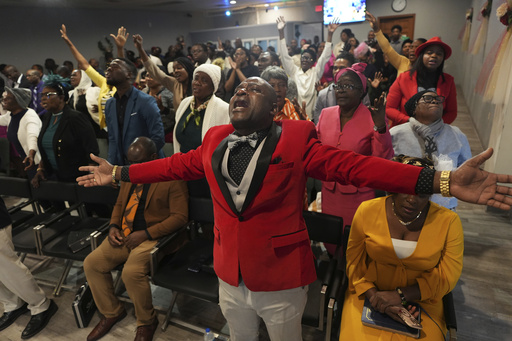
Over two dozen religious organizations, encompassing millions of Americans, have collectively taken legal action against a policy initiated by the Trump administration that permits immigration agents to conduct arrests within places of worship. The federal lawsuit, submitted to the U.S. District Court in Washington, argues that this new directive is inciting fear of raids, which is detrimental to worship attendance and essential community programs. According to the complaint, this policy infringes upon the groups’ religious freedoms, particularly regarding their commitment to assist migrants, including those living in the U.S. without legal status.
Bishop Sean Rowe of the Episcopal Church articulated the diverse backgrounds of congregants involved, stating, “We have immigrants, refugees, people who are documented and undocumented.” He emphasized that individuals within these communities cannot practice their faith freely while living in fear. By participating in the lawsuit, the religious leaders aim to secure their right to assemble and fully express their beliefs, echoing the moral imperative to love one’s neighbors.
This legal challenge builds on a similar lawsuit pursued by several Quaker congregations earlier in the year, which was bolstered by support from organizations like the Cooperative Baptist Fellowship and a Sikh temple. That case is still in progress in the U.S. District Court in Maryland.
In response to these legal actions, defendants named include the Department of Homeland Security (DHS) and its immigration enforcement entities. Tricia McLaughlin, the DHS assistant secretary for public affairs, defended the policy by stating it is meant to protect schools and houses of worship from exploitation by criminals. She maintained that the new rule equips law enforcement with the necessary authority to fulfill their responsibilities.
Additionally, a memorandum from the Department of Justice (DOJ) aimed at countering the previous Quaker lawsuit argued that the claims made by the plaintiffs are speculative and therefore do not provide sufficient reasoning for an injunction. The DOJ noted that enforcement of immigration laws in houses of worship had been an accepted practice for years, with the recent policy merely allowing agents to exercise discretion in conducting operations without prior supervisory approval.
Notably, while this memo discussed the merits of narrowly tailored relief for the plaintiffs, it implied that a national injunction against the new policy may be unwarranted. It emphasized that any protective measures should only apply to the plaintiffs involved in the current suit.
The current lawsuit features a significantly broader array of religious groups than the earlier Quaker case, representing various faith communities including over 1 million members from Reform Judaism, 1.5 million Episcopalians across 6,700 congregations, nearly 1.1 million Presbyterians, and 1.5 million active members of the African Methodist Episcopal Church, the oldest predominantly Black denomination in the U.S. Other organizations include the Christian Church (Disciples of Christ), the Church of the Brethren, and multiple other denominations.
Legal expert Kelsi Corkran, leading the case, underscored that these organizations respond to their theological mandates to support and serve immigrants, irrespective of their legal status. She noted that before recent changes implemented by the Trump administration, immigration agents were typically required to obtain judicial approval to execute operations in sensitive locations such as places of worship.
Corkran highlighted incidents, such as the arrest of a Honduran man outside a church in Atlanta during a service, as examples illustrating the chilling effect of the new policy. The lawsuit elaborates on how various congregations, including the Union for Reform Judaism and Mennonites, provide critical services like food banks and homeless shelters that could be negatively impacted by increased fear among community members.
The complaint also includes perspectives from leaders like Rev. Carlos Malavé of the Latino Christian National Network, who remarked on the pervasive anxiety many feel towards the government, leading to decreased attendance in churches and a shift towards online services for safety.
While the U.S. Conference of Catholic Bishops did not join the lawsuit, it has expressed its discontent regarding the administration’s strict immigration policies. In a recent statement, Pope Francis criticized such deportation practices, emphasizing the inherent dignity of all individuals and warning against the negative outcomes of heavy-handed immigration tactics.
Conversely, some conservative religious leaders and academics do not view the new enforcement policy as problematic. Mat Staver, founder of the Liberty Counsel, stated that places of worship should not serve as refuges for those engaging in unlawful activities, asserting that legal accountability applies to everyone, regardless of venue.
Cathleen Kaveny, a professor at Boston College, raised questions regarding the effectiveness of the religious freedom argument in court but indicated that the administration may want to consider the traditional role of religious venues as sanctuaries for those in need.
This ongoing legal battle highlights the complex interplay of religious beliefs, immigration policy, and civil rights as diverse communities band together to advocate for a safe and welcoming environment for all.

